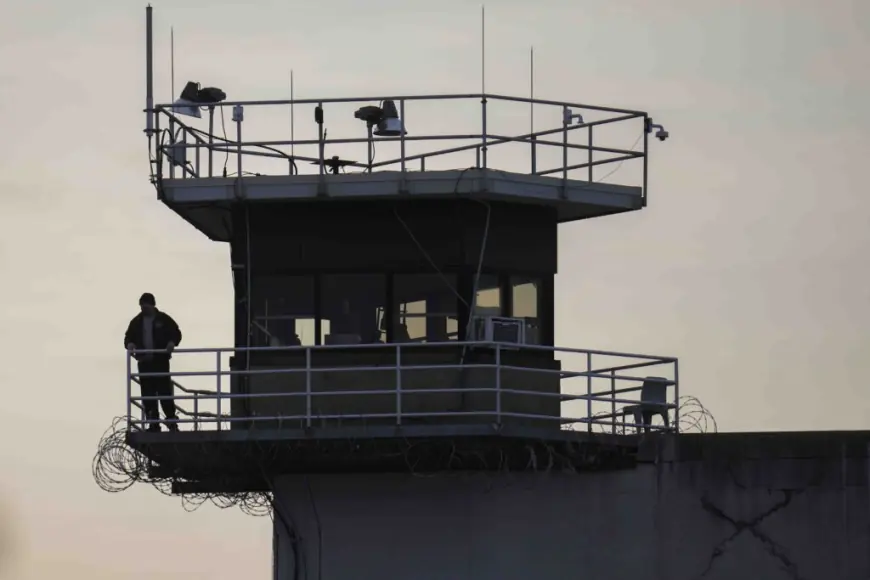Man convicted of quadruple homicide is put to death in Indiana’s 1st execution in 15 years
MICHIGAN CITY, Ind. (AP) — An Indiana man convicted of killing four people including his brother and his sister’s fiancé…

MICHIGAN CITY, Ind. (AP) — An Indiana man convicted of killing four people including his brother and his sister’s fiancé decades ago was put to death Wednesday, without any independent witness, marking the state’s first execution in 15 years.
Joseph Corcoran, 49, was pronounced dead at 12:44 a.m. CST at the Indiana State Prison in Michigan City, Indiana, the Indiana Department of Correction said in a statement. Corcoran was scheduled to be executed with the powerful sedative pentobarbital, but the state agency’s statement did not mention that drug. Corcoran’s execution was the 24th in the U.S. this year.
He was convicted in the July 1997 shootings of his brother, 30-year-old James Corcoran, his sister’s fiancé, 32-year-old Robert Scott Turner, and two other men, Timothy G. Bricker, 30, and Douglas A. Stillwell, 30.
According to court records, before Corcoran fatally shot the four victims he was under stress because the forthcoming marriage of his sister to Turner would necessitate moving out of the Fort Wayne, Indiana, home he shared with his brother and sister.
While jailed for those killings, Corcoran reportedly bragged about fatally shooting his parents in 1992 in northern Indiana’s Steuben County. He was charged in their killings but acquitted.
Last summer, Gov. Eric Holcomb announced plans to resume state executions following a yearslong hiatus marked by a scarcity of lethal injection drugs nationwide.
The state provided limited details about the execution process, and no media witnesses were permitted under state law.
Indiana and Wyoming are the only two states that do not allow members of the media to witness state executions, according to a recent report by the Death Penalty Information Center.
Corcoran’s attorneys had fought his death penalty sentence for years, arguing he was severely mentally ill, which affected his ability to understand and make decisions. This month his attorneys asked the Indiana Supreme Court to stop his execution but the request was denied.
Corcoran exhausted his federal appeals in 2016. But his attorneys asked the U.S. District Court of Northern Indiana last week to stop his execution and hold a hearing to decide if it would be unconstitutional because Corcoran has a serious mental illness. The court declined to intervene Friday, and the U.S. Court of Appeals for the 7th Circuit did the same Tuesday.
Corcoran’s attorneys then asked the U.S. Supreme Court issue an emergency order halting his execution, but the high court denied their request for a stay late Tuesday, ending Corcoran’s options with the courts.
His sole remaining hope then became Holcomb, who could have commuted Corcoran’s death sentence. But that commutation never came and the execution proceeded as scheduled.
Indiana’s last state execution was in 2009 when Matthew Wrinkles was put to death for killing his wife, her brother and sister-in-law in 1994. Since then, 13 executions were carried out in Indiana but those were initiated and performed by federal officials in 2020 and 2021 at a federal prison in Terre Haute.
State officials have said they couldn’t continue executions because a combination of drugs used in lethal injections had become unavailable.
For years, there has been a shortage across the country because pharmaceutical companies have refused to sell their products for that purpose. That’s pushed states, including Indiana, to turn to compounding pharmacies, which manufacture drugs specifically for a client. Some use more accessible drugs such as the sedatives pentobarbital or midazolam, both of which, critics say, can cause intense pain.
Religious groups, disability rights advocates and others have opposed his execution. About a dozen people, some holding candles, held a vigil late Tuesday to pray outside the prison, which is surrounded by barbed wire fences in a residential area about 60 miles (90 kilometers) east of Chicago.
“We can build a society without giving governmental authorities the right to execute their own citizens,” said Bishop Robert McClory of the Diocese of Gary, who led the prayers.
Other death penalty opponents also demonstrated outside the prison Tuesday night, some holding signs that read “Execution Is Not The Solution” and “Remember The Victims But Not With More Killing.”
“There is no need and no benefit from this execution. It’s all show,” said Abraham Borowitz, director of Death Penalty Action, his organization that protests every execution in the U.S.
Prison officials said in a brief statement Tuesday evening that Corcoran “requested Ben & Jerry’s ice cream for his last meal.”
Corcoran said farewell late Tuesday to relatives, including his wife, Tahina Corcoran, who told reporters outside the prison that they discussed their faith and their memories, including attending high school together. She reiterated her request for Indiana’s governor to commute her husband’s death sentence.
Tahina Corcoran said her husband is “very mentally ill” and she doesn’t think he fully grasps what is happening to him.
“He is in shock. He doesn’t understand,” she said.
___
Callahan reported from Indianapolis.
What's Your Reaction?









































































































